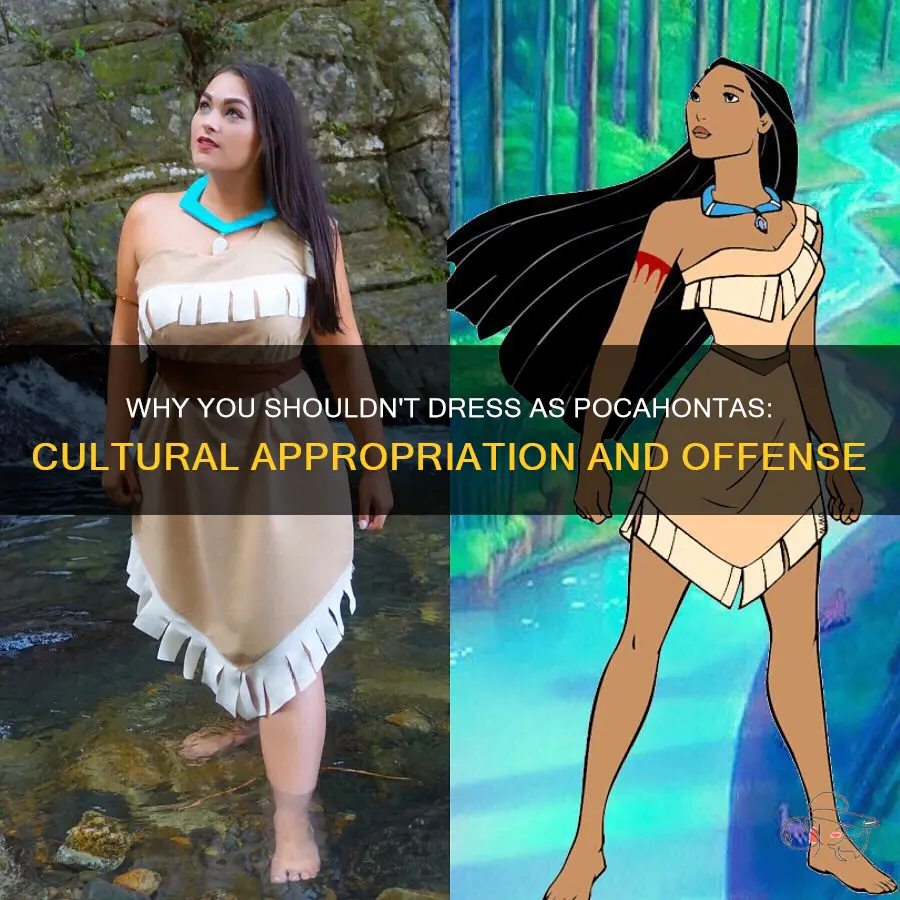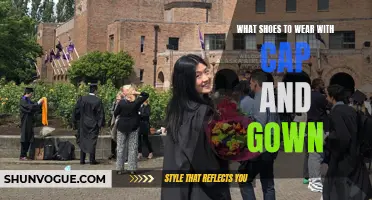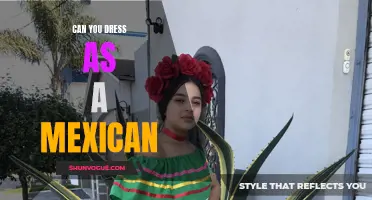
The debate surrounding cultural appropriation and Halloween costumes has reached new heights in recent years, with Pocahontas being one of the most controversial choices. While it may seem innocent to dress up as the iconic Native American princess, it is important to recognize the deeper implications of such a costume. By delving into the history and significance of Pocahontas, we can better understand why it is inappropriate for non-Native individuals to don her attire for Halloween or any other occasion.
| Characteristics | Values |
|---|---|
| Character's Name | Pocahontas |
| Gender | Female |
| Age | Young woman |
| Native American Tribe | Powhatan |
| Traditional Clothing | Fringed dress, moccasins |
| Hair Color | Black |
| Braided Hair | Yes |
| Face Paint | No |
| Jewelry | Turquoise necklace |
| Feather Headdress | No |
| Weapon | None |
| Animal Companion | Meeko the raccoon |
| Singing Voice | Judy Kuhn |
| Speaking Voice | Irene Bedard |
What You'll Learn

Impact of Cultural Appropriation in Pocahontas Costumes
Cultural appropriation is a term that refers to the adoption or use of elements from one culture by members of another culture. It becomes a problem when these elements are taken out of their original cultural context and are used in a way that can be disrespectful or offensive to the culture they come from.
One prime example of cultural appropriation is the case of Pocahontas costumes. Pocahontas was a real historical figure and a member of the Powhatan people, who lived in what is now known as Virginia. She was a significant figure in the early colonisation of America and has become a symbol of Native American culture.
However, dressing up as Pocahontas for Halloween or any other occasion can have a negative impact and perpetuate harmful stereotypes. Here are some reasons why these costumes are problematic:
- Disrespectful to Native American culture: Native American culture is rich and diverse, with a long and complex history. When people dress up as Pocahontas or any other Native American character, they often reduce the culture to stereotypes and caricatures, disregarding its complexity and significance.
- Misappropriation of sacred symbols: Many Pocahontas costumes include headdresses or other sacred symbols that hold deep spiritual meaning for Native American tribes. Wearing these items as a costume trivializes their cultural significance and is highly disrespectful.
- Reinforces harmful stereotypes: Pocahontas costumes often perpetuate stereotypes about Native Americans, such as the "noble savage" or the "sexy squaw." These stereotypes are outdated and harmful, as they dehumanize Native American people and diminish their diverse cultures and contributions.
- Historical inaccuracy: Pocahontas costumes often distort the historical reality and reduce a complex individual to a simplistic character. Pocahontas was a real person with her own story, and by dressing up as her, people overlook the historical context and significance of her life.
So, what can we do to avoid perpetuating cultural appropriation and its impact with Pocahontas costumes?
- Educate yourself: Take the time to learn about the history, traditions, and contributions of Native American tribes. Understand the cultural significance of symbols and customs, and avoid using them inappropriately.
- Choose respectful alternatives: Rather than dressing up as Pocahontas, consider costumes that celebrate and respect Native American culture in an authentic and informed way. For example, you could dress up as a specific tribe member or a modern Native American figure.
- Support Native-owned businesses: Instead of purchasing mass-produced Pocahontas costumes, seek out Native-owned businesses that sell authentic Native American clothing and accessories. This way, you can support the community directly and promote cultural appreciation rather than appropriation.
- Have conversations: Engage in meaningful discussions with your friends, family, and community about the harmful impact of cultural appropriation. Raise awareness about the importance of respecting and appreciating diverse cultures without appropriating them.
In conclusion, the impact of cultural appropriation in Pocahontas costumes is significant. By understanding the concerns and being mindful of the potential harm caused by such costumes, we can contribute to a more respectful and inclusive society. Let us celebrate and appreciate cultures without appropriating them, ensuring that our costumes and actions do not perpetuate stereotypes or disrespect the rich traditions of others.
The ultimate guide on what to wear to a navy ball
You may want to see also

Cultural Insensitivity and Stereotyping in Pocahontas Dress-Up
In today's society, cultural sensitivity and understanding are crucial to promoting inclusivity and respect for all individuals and cultures. One area where this is often overlooked is in the realm of costume dress-ups, particularly when it comes to costumes based on historical figures or characters from different cultures. One such example is the Pocahontas dress-up, which can be seen as culturally insensitive and perpetuating stereotypes.
Pocahontas was a real historical figure and a member of the Powhatan tribe in what is now the United States. Her story, as portrayed in the Disney movie, has been romanticized and is far from an accurate representation of her life and culture. Dressing up as Pocahontas can be seen as disrespectful and offensive to Native American cultures and reinforces harmful stereotypes.
When it comes to cultural costumes, it is important to consider the historical and cultural significance of the attire we are wearing. Pocahontas' traditional clothing was not a costume but rather an integral part of her culture and identity. Dressing up as Pocahontas for Halloween or any other occasion can trivialize and commodify her culture, reducing it to a mere costume.
Cultural appropriation occurs when elements of one culture are adopted by individuals from a different culture without fully understanding or respecting their significance. By dressing up as Pocahontas, individuals may unintentionally engage in cultural appropriation. It is essential to recognize the harmful impact that cultural appropriation can have on marginalized communities and strive to avoid it.
Instead of dressing up as Pocahontas, we can foster cultural sensitivity and respect by educating ourselves about Native American cultures and celebrating them in appropriate ways. Rather than perpetuating stereotypes, we should aim to learn about and appreciate the diverse histories and traditions of Native American communities.
If you are interested in celebrating Native American cultures, consider engaging with authentic Native American artwork, literature, or films that accurately and respectfully represent their stories and experiences. By supporting Native American artists and creators, we can actively promote cultural understanding and appreciation.
In conclusion, dressing up as Pocahontas can be seen as culturally insensitive and perpetuating stereotypes. It is important to recognize the historical and cultural significance behind these costumes and strive to avoid cultural appropriation. Instead, let's educate ourselves, support authentic representations of Native American cultures, and foster a society that values and respects all cultures.
Undergarment Essentials for Lederhosen Attire
You may want to see also

Historical Inaccuracy and Misrepresentation in Pocahontas Costumers
Pocahontas is a historical figure known for her important role in the early colonization of America. Unfortunately, her legacy has been inaccurately portrayed and misrepresented, particularly in costumes and dress-up attire. This blog post aims to shed light on the historical inaccuracies and misrepresentations in Pocahontas costumes, in order to raise awareness and promote cultural sensitivity.
Cultural Appropriation:
One of the primary issues with Pocahontas costumes is the rampant cultural appropriation they exhibit. The costumes often borrow elements from Native American cultures, misrepresenting their traditional clothing, patterns, and symbols. This appropriation disrespects and diminishes the cultural significance of Native American tribes, contributing to their ongoing erasure.
Inaccurate Clothing and Accessories:
Pocahontas costumes frequently feature inaccurate clothing and accessories. While Pocahontas was a Native American woman, the costumes often blend elements from various tribes or overly simplify traditional garments. For example, feathered headdresses are commonly included, even though they are usually associated with Plains Indian tribes, not Pocahontas' Powhatan tribe.
Misrepresentation of Pocahontas' Historical Role:
Pocahontas is a complex historical figure whose story is often distorted in costume portrayals. Instead of depicting her as a brave mediator and diplomat between the Native Americans and the colonizers, the costumes often objectify her as a sexualized fantasy character. This misrepresentation diminishes the historical significance of Pocahontas' actions and contribution to early American history.
Harmful Stereotypes:
Pocahontas costumes perpetuate harmful stereotypes about Native American individuals. The exaggerated features, warpaint, and oversexualized clothing in these costumes contribute to the fetishization and objectification of Native women. Such stereotypes not only perpetuate racism but also fail to recognize the rich diversity and complexity within Native American cultures.
It is essential to acknowledge and address the historical inaccuracies and misrepresentations present in Pocahontas costumes. By raising awareness about the issue, we can promote cultural sensitivity and respect for Native American cultures. Instead of perpetuating harmful stereotypes, consider embracing authentic representations of historical figures, valuing accuracy, and celebrating the diversity and cultural heritage of Native American communities. Let us move away from appropriation and towards understanding and appreciation.
What to Wear on a Motorcycle: Essential Gear for Safety and Style
You may want to see also

Promoting Respect and Understanding by Avoiding Pocahontas Costumes
In recent years, there has been a growing awareness regarding cultural appropriation and its harmful effects. It is essential to promote respect and understanding by avoiding costume choices that perpetuate stereotypes and disrespect traditional cultures. This article aims to shed light on the issue of dressing up as Pocahontas and why it is important to choose alternative costumes that foster inclusivity and appreciation for diverse cultures.
The Historical Significance of Pocahontas:
Pocahontas, a historical figure, played a crucial role in early American history. Labeling her as a fictional Disney princess significantly diminishes her true heritage, experiences, and legacy. It is essential to recognize and respect her as more than a character, especially during costume occasions.
Cultural Appropriation and Harmful Stereotypes:
Dressing up as Pocahontas without fully understanding and respecting her culture perpetuates harmful stereotypes. It reduces an entire Native American tribe's rich history and traditions to a costume, trivializing their struggles and experiences. This not only disrespects the culture but also contributes to the ongoing marginalization of indigenous communities.
Empathy and Understanding:
Promoting empathy and understanding is crucial to build a more inclusive society. Instead of appropriating someone else's culture, we should strive to learn about different traditions, their significance, and their historical context. This understanding helps us see beyond the surface and fosters genuine connections with people from diverse backgrounds.
Choosing Alternative Costumes:
There are countless other costume choices that are both fun and respectful of different cultures. Consider a broader range of options from various historical periods, fictional characters, or international cultures that do not perpetuate harmful stereotypes. Opting for costumes that celebrate diversity rather than appropriating cultures encourages inclusivity and sets a positive example.
Celebrating Cultural Diversity:
Instead of using Halloween or costume events as an opportunity to perpetuate stereotypes, use them as a chance to celebrate cultural diversity. Encourage discussions about different traditions, promote educational activities, or organize cultural fairs that allow participants to learn and appreciate various cultures authentically.
Educating and Raising Awareness:
In order to combat cultural appropriation and promote understanding, we must educate ourselves and raise awareness among our friends, family, and communities. Share articles, engage in open conversations, and participate in workshops that address cultural sensitivity and appreciation. By actively learning and teaching, we can contribute to building a more inclusive society.
Promoting respect and understanding involves making conscious choices, especially when it comes to costume selections. By avoiding Pocahontas costumes and other forms of cultural appropriation, we can foster a more inclusive society that appreciates and celebrates diverse cultures. Let us prioritize empathy, education, and respect as we navigate costume events or daily life, aiming to build bridges between cultures rather than perpetuating harmful stereotypes.
How to Style a Black Maxi Skirt: Outfit Ideas and Fashion Tips
You may want to see also







